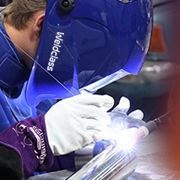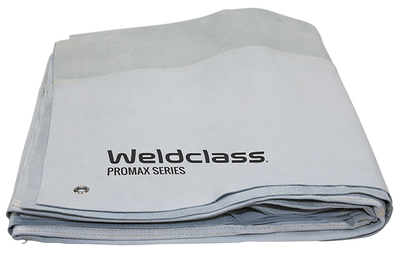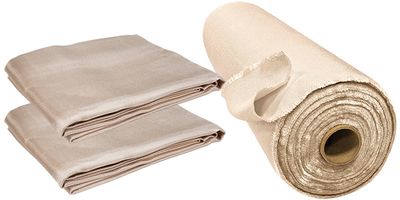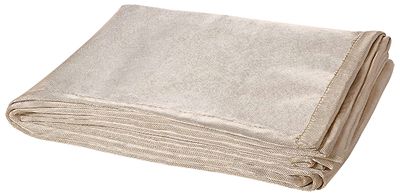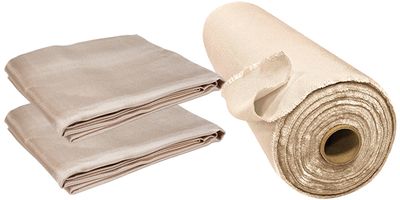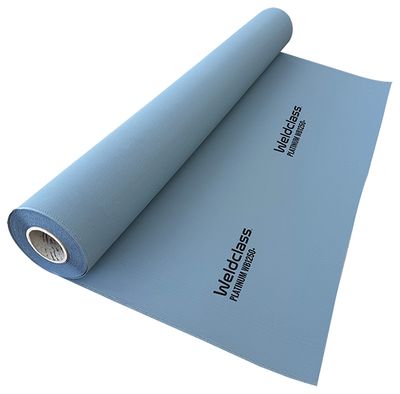Welding Blankets Australia | Blanket Selection Chart


Australia's best range of Welding Blankets, Drapes and Fabric Rolls for: protection during welding, grinding and cutting, heat treatment/retention, & more.
The Weldclass blanket range includes leather, glass fibre, silica, and high-temperature next-generation fabrics that provide new levels of protection, safety and ergonomics.
-
Heavy duty cowhide leather welding blanket / drapes. Sewn with long life kevlar thread & complete with eyelets. At Weldclass, we sell a lot of leather blankets right across Australia, contact us with your enquiry today! Sizes available: 1x2m, 1.8x1.8m, 2x2m, 3x3m. Recommended for protection against grinding sparks and light to medium welding spatter.
Blanket Selection Chart Blanket Range Pdf -
PROMAX WB550 is a ‘general purpose’ high-temperature welding blanket for protection against grinding sparks, light to medium welding spatter, etc. Also used for heat treatment / stress relieving / heat retention (wrapping of heated objects to slow cooling). Withstands up to 550°c long duration & ~700°c short duration exposure. Heat-treated to reduce fraying and irritation, with heavier weight for increased durability and insulating properties. Available in blankets and rolls.
Blanket Selection Chart Blanket Range Pdf -
PROMAX WB1000 is a ‘medium duty’ welding blanket made from high-temperature fabric for protection against grinding sparks, medium-to-heavy welding spatter, etc. Also used for heat treatment / stress relieving / heat retention (wrapping of heated objects to slow cooling). Specially treated glass fibre to withstand up to 800°c long duration & 1000°c short duration exposure, and to improve insulating properties. Strong, durable, and abrasion-resistant, with heavier weight for longer service life.
Blanket Selection Chart Blanket Range Pdf -
PROMAX WB1100 is a heavy duty high-temperature welding blanket made from silica glass fabric for protection against heavier sparks, spatter, slag, etc. Also used for heat treatment / stress relieving / heat retention (wrapping of heated objects to slow cooling). Provides max working temperature exposure of 1100°c and up to 1600°c short duration exposure, with heavier weight for increased durability and insulating properties. Available in blankets and rolls.
Blanket Selection Chart Blanket Range Pdf -
Not your average welding blanket ! PLATINUM WB1250+ is a 'next generation' high-temperature fabric with a high-tech proprietary coating that provides superior performance and safety/ergonomics. This allows PLATINUM WB1250+ fabric to be lightweight, whilst offering protection and durability that is superior to other much thicker & heavier fabrics. Provides max working temperature exposure of 1200°c and up to 1600°c short duration exposure.
Unlike most other high-temperature welding blankets / fabrics, PLATINUM WB1250+ is completely non-irritant, does not shed dust or raw fibres, and is very safe and comfortable to handle. Resists fraying and can be easily cut to any required length or shape.
Blanket Selection Chart Blanket Range Pdf
Welding Blanket Selection Chart
Use this handy chart to find the most suitable Weldclass welding blanket / drape / fabric for your application, or download in pdf version here.
| Product Click for more info → |
|||||
|
Key Features |
• General purpose |
• General purpose • Economical • Glass fibre, heat-treated to reduce fraying & irritation • Heavier weight for durability |
• 'Medium duty' • Glass fibre, treated for higher temperature resistance & heat retention • Strong & abrasion resistant • Heavier weight for durability |
• 'Heavy duty' • Silica glass fabric for high temperature tolerance • Protects against heavier sparks, spatter, slag, etc • Soft & flexible fabric • Heavier weight for durability |
• 'Heavy duty' |
|
Sizes Available |
1.0x2.0m |
1.0x1.8m 1.8x2.0m* 2.0x3.0m 1.0x25m Roll |
0.9x1.8m 1.8x1.8m |
0.9x1.8m 1.8x2.0m* 3.0x3.0m 0.9x25m Roll |
1.0x23m Roll |
| Specifications | |||||
| Product | PROMAX Leather | PROMAX WB550 | PROMAX WB1000 | PROMAX WB1100 | PLATINUM WB1250+ |
| Fabric Type | Leather | Glass Fibre | Glass Fibre | Silica Glass | Special |
| Max Recommended Working Temperature* | ~200oc | ~550oc | ~800oc | ~1100oc | ~1200oc |
| Max Short Term / Momentary Heat Resistance | ~250oc | ~700oc | ~1000oc | ~1600oc | ~1600oc |
| Nominal Weight | 900-1100gsm | 1000gsm | 1100gsm | 1200gsm | 500gsm |
|
Nominal Thickness |
1.2mm |
1.5mm | 1.5mm | 1.2mm |
0.5mm |
|
✅✅ Best Option ✅ Commonly Used ⚫ Sometimes Used ❌ Not Recommended |
|||||
|
Product |
PROMAX Leather | PROMAX WB550 | PROMAX WB1000 | PROMAX WB1100 | PLATINUM WB1250+ |
|
Grinding_____________ |
✅ | ✅ | ✅ | ✅ | ✅✅ |
|
Light Welding & Cutting |
✅ | ✅ | ✅ | ✅ | ✅✅ |
|
Medium Welding & Cutting |
⚫ | ⚫ | ✅ | ✅ | ✅✅ |
|
Heavy Welding, Cutting, Gouging |
❌ | ❌ | ⚫ | ✅ | ✅✅ |
|
Stainless Welding |
⚫ | ⚫ | ⚫ | ✅ | ✅✅ |
|
Aluminium Welding |
✅ | ✅ | ✅ | ✅ | ✅✅ |
|
Stress Relieving / Heat Retention |
❌ | ✅ | ✅ | ✅✅ | ❌ |
|
Drape or Screen |
✅✅ | ✅ | ✅ | ✅ | ✅✅ |
*Temperature resistance is indicative only and can vary depending on usage conditions. A safety margin should be allowed for, especially in critical applications. Blankets are not indestructable and will wear and degrade from use over time. If protecting critical or costly surfaces / items, always use more layers initially and test on a non-critical surface first. As applications and usage conditions vary widely, no warranty or fitness for use in any specific application is implied or intended.
What is a Welding Blanket?
A welding blanket is a protective tool used in welding processes to safeguard surroundings from sparks, slag, and spatter. Typically made from fire-resistant materials like fiberglass or silica, these blankets form a barrier that can withstand high temperatures, preventing heat damage to nearby objects or materials. They're especially crucial in confined spaces or when welding near other objects and equipment, providing a reliable shield against potential damage, fire, or burns. Additionally, welding blankets can come in various sizes and thicknesses to suit different welding applications, making them versatile and essential safety equipment in welding environments.
What is a Welding Drape?
The terms welding blanket and welding drape are often used interchangeably, and in many applications the type of fabric used is, and can be, the same for both applications.
Technically, a welding drape is a specialized protective covering used during welding operations to shield specific areas or pieces of equipment from sparks, heat, and debris. Where welding blankets are often used to provide broad-area protection, welding drapes are designed for targeted coverage, such as protecting vertical or overhead surfaces, machinery, or equipment from welding hazards. They are typically made from similar fire-resistant materials as welding blankets, such as fiberglass or silica, but are tailored for hanging or draping over specific areas that require protection. Ideally, the fabric used for welding drapes should have a smoother surface to allow sparks etc to slide or cascade off.
How should welding blankets be used?
Best practice for use of welding drapes and blankets will vary depending on the application, however following is a general guide:
- If protecting critical or costly surfaces / items, allways use more layers initially, and test on a non-critical surface first
- When using for surface protection: If possible use on an incline of at least 15 degrees, or when neccessary to use in horizontal position add more layers
- Where the blanket is in closer proximity to the source of sparks etc, consider adding more layers of blanket/fabric as the sparks/spatter will have less time to cool and will be at a higher temperature at the point of touching/impact with the blanket
- Use hand, eye and respiratory protection during handling and use, to protect against airborn fibres and any dust/debris that has fallen on the blanket during use
- Worn or damaged blankets will compromise protection and should be replaced
Can a fire blanket be used for welding?
While both fire blankets and welding blankets are designed to withstand high temperatures and provide thermal protection, they serve different purposes and have distinct features that make them suitable for specific applications.
Welding blankets are typically heavier and thicker than fire blankets, with higher temperature resistance, to resist penetration from sparks and welding spatter during ongoing use - whereas fire blankets are typically lighter and more compact for emergency use, and designed to smother and quickly extinguish flames.
While a fire blanket may offer some degree of very light-duty protection in a welding environment, it is not specifically designed for this purpose and may not provide adequate coverage or durability compared to a dedicated welding blanket. It's always best to use equipment and materials that are specifically designed and rated for the task at hand to ensure optimal safety and protection.
How Welding Blankets are Used for Heat Treatment and Heat Retention
Welding blankets are not only essential for protection during welding but also play a crucial role in heat treatment and controlled cooling processes, also known as stress-relief. Made from heat-resistant materials such as fiberglass or silica, these blankets are used to cover and wrap around metal parts during heat treatment to retain heat, ensuring uniform temperature distribution. This helps in achieving the desired metallurgical properties by preventing rapid cooling and reducing thermal gradients, which can lead to warping or cracking. Additionally, welding blankets facilitate controlled cooling by gradually reducing the temperature, thereby minimizing internal stresses and enhancing the structural integrity of the treated metals. Their versatility in managing heat makes them invaluable in various industrial applications beyond welding.
Care has to be taken in selection of suitable blankets for this application, especially if the blanket has a coating as some coatings give off gases when in contact with heat that can contaminate the surface being treated, and depending on the coating used these fumes are often hazardous / toxic. Most Weldclass blankets are suitable for use in this application & give off very little or no gases/fumes, see above chart for more details.
What is welding blanket made of?
Welding blankets are made from different types of fabric, which offer different levels of temperature resistance, different price levels, and particular attributes and advantages. Leather and glass fibre are some of the common materials used for welding blankets. For more details, see What Are Welding Blankets Made Of.
Welding Blanket Demonstration Video
The following video is a demonstration featuring the PLATINUM WB1250+ welding blanket. Using an oxy cutting machine to cut 10mm steel plate, the blanket was exposed to heavy sparks and molten slag. All sparks etc were retained by the blanket, and the blanket fabric was not penetrated.


